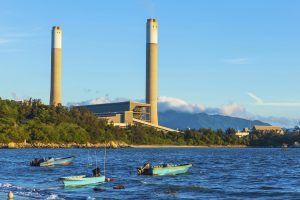Indonesia’s energy future hangs in the balance. The nation’s dependence on coal – responsible for powering about two-thirds of its electricity – poses a significant barrier to achieving its climate goals.
Despite its pledge under the Paris Agreement in 2015, Indonesia’s coal capacity has since more than doubled. Indonesia recorded the highest increase in the use of unabated fossil fuels over the past five years among emerging economies, which also include India, Brazil, and Mexico.
The slow progress in transitioning away from fossil fuels is due to higher energy demand from the growing economy and population, coupled with insufficient domestic policies and international support.
In recent years, both domestic and international policies have emerged to bolster the country’s energy transition. Indonesia has set a goal of achieving net zero by 2060, alongside an Enhanced Nationally Determined Contribution (NDC) aiming to limit emissions to 32-43 percent below business as usual by 2030. The Second NDC, to be announced in 2025, is expected to have a more ambitious 2035 target. These commitments reflect a growing recognition of the urgent need for an energy transition and Indonesia’s untapped potential for solar PV, geothermal, and hydropower generation.
However, unlocking this potential is no small task. High financing costs continue to be a significant barrier to scaling up clean energy projects. For instance, financing costs account for about half of the levelized cost of electricity for a utility-scale solar PV plant in Indonesia, compared to only 25-27 percent in Europe and the United States.
This year’s United Nations Climate Change Conference (COP29) in Baku, Azerbaijan, presents a crucial opportunity to galvanize international and multilateral efforts, particularly through Indonesia’s Just Energy Transition Partnership (JETP). The JETP’s $20 billion financing mechanism, spearheaded by the United States and Japan, targets peaking emissions by 2030 and reaching net zero in the Indonesian power sector by 2050.
While the JETP was initially hailed as a game-changer, its implementation in Indonesia has faced significant hurdles. The partnership’s Comprehensive Investment and Policy Plan (CIPP) estimates that around $97 billion is needed to finance more than 400 priority projects aimed at achieving Indonesia’s climate goal by 2030. Yet, the JETP only provided $20 billion, leaving a huge climate financing gap.
Furthermore, most of the JETP funds are also expected to come in as loans, with only less than 2 percent to be disbursed as grants. 14 percent of JETP finance is non-concessional, meaning that the rates are no better than those available on the open market. This financial arrangement raises concerns about the initiative’s ability to send strong policy and financial signals to domestic stakeholders, thereby unlocking the green energy transition.
Importantly, the JETP was expected to provide cheaper long-term financing in Indonesia but doesn’t. Even Cirebon-1, the 660 MW coal-fired power plant in West Java, to be financed for early retirement under the JETP has struggled to close a deal for shutdown due to legal and financial risks.
Simultaneously, domestic policies, including the much-awaited carbon pricing mechanism, have not been stringent enough to give strong signals for crowding in private investments.
Indonesia’s Emissions Trading System, slated to evolve into a hybrid “cap-tax-and-trade” system, provides 100 percent free allocation to emitters and currently only serves a domestic voluntary market far from liquid with very low demand. The carbon tax law has not come into force since the tax rate is dependent on the market price of carbon.
Increasing the carbon price from its current low value poses economic and political challenges. A recent survey conducted by the Climate Policy Lab at the Fletcher School, Tufts University, and Landscape Indonesia in Jakarta indicates that experts in Indonesia fear that carbon pricing will inflate public expenditure, even as they acknowledge its effectiveness in achieving the long-term climate target.
Further, most experts evaluated that achieving targets in Indonesia’s Enhanced Nationally Determined Contributions would be challenging, in part due to vested interests among fossil fuel stakeholders.
At the same time, the survey results suggest that enhancing other policies – such as feed-in tariffs for renewables, REDD+, and carbon capture and storage initiatives – could help Indonesia achieve net zero by 2060. Reforming fossil fuel subsidies could further aid the transition away from coal.
With current policies and Indonesia’s JETP falling short, the financing cost of renewables in Indonesia is unlikely to come down fast enough to ramp up clean energy production. International partnerships like the JETP are crucial for developing countries including Indonesia to reduce the capital costs associated with clean energy projects.
As Indonesia seeks to bridge the gap between its current trajectory and its net zero goal, COP29 in Baku presents a pivotal opportunity to advance international support and enhance commitments to the JETP. Urgent action is needed to ensure that Indonesia’s path to net zero is not just a distant aspiration but a tangible reality.

































